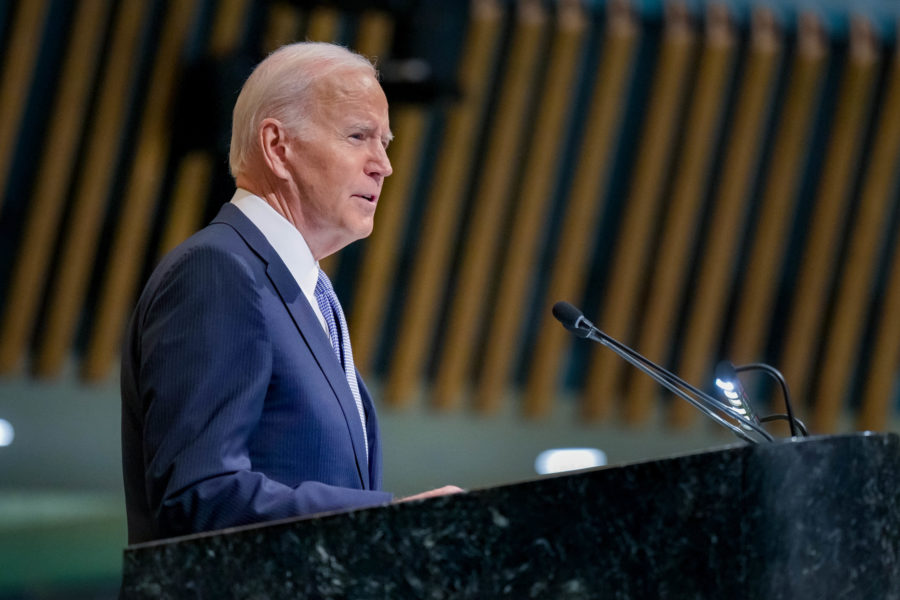As the 2023 National Defense Authorization Act awaits President Joe Biden’s signature to officially become law, Air & Space Forces Association leaders lauded the overwhelming bipartisan majorities that passed the bill in both the House and Senate, and urged the President to sign the bill swiftly.
A top official said Biden will consider the bill “as a whole,” suggesting he may be willing to overlook a provision that would undo the COVID-19 vaccine mandate now in place for all service members.
“It’s gratifying to see strong bipartisan support for the Department of Defense,” said AFA Chairman of the Board Bernie Skoch. “AFA is particularly pleased that with this legislation Congress is increasing our nation’s investment in national defense, and in particular in our Air and Space Forces. We encourage President Biden to sign this bill into law and to continue improving, modernizing, and strengthening our armed forces in the year to come. Never has having a ready and capable military been more critical to our nation.”
The NDAA, an annual defense policy bill, cleared the Senate on Dec. 15 by 83-11, after clearing the House 350-80. White House officials have declined to say whether Biden might veto the legislation over the provision to end the COVID-19 vaccine mandate. That requirement, put in place by Defense Secretary Lloyd Austin in September 2020, is generally credited with the military’s strong COVID-19 response, with some two million troops vaccinated. But it has also sparked lawsuits and controversy, as thousands of service members have been booted for refusing the shots.
National Security Council spokesman John F. Kirby declined Dec. 16 to speculate on whether Biden might veto the legislation. If he does, it would be the first of his presidency.
“Every single year the NDAA has things in it that we support, and it has things in it that we don’t support,” Kirby said, according to multiple media outlets. “The president will judge this NDAA as a whole, just as he has in the past. I’m not going to get ahead of the president.”
But while Kirby said repealing the vaccine mandate would be a “mistake,” and not in the “best interest” of military readiness, he also said Biden understands the value of signing the NDAA so the Defense Department can function smoothly.
“[Biden] also obviously believes that it’s important to fund our military,” Kirby said. “Getting an NDAA so that they can continue to allow the military to defend our national security interests around the world is obviously of prime importance to the president.”
While the NDAA does not appropriate funds, it does authorize spending. If the president were to veto the legislation, Congress could modify it or override his veto, given the strong bipartisan support for the bill. Because Congress is already busy trying to pass an omnibus spending bill, and time is short before the Christmas recess, however, overriding a veto might still be difficult.
The NDAA includes hundreds of new policy directives, mandatory reviews, and required studies. These include several provisions AFA leaders advocated for in the past year. For example:
- For the Air Force, the bill would prohibit the retirement of any F-22 fighters through Sept. 30, 2027—the service had asked to retire 33 of its oldest Block 20 Raptors, saying they were too costly to maintain or upgrade. That request was met with fierce pushback from both the House and Senate Armed Services committees, and in a statement, AFA also called for the F-22 fleet to keep at least 184 aircraft, especially “as China ramps up production of its own fifth-generation J-20 fighter.”
- Additionally, the NDAA also would add five F-35A fighters to the Air Force’s request of 33, bringing the total 2023 buy to 38. That’s still 10 fewer than it bought in fiscal 2022 and 22 fewer than 2021, but it does represent an increase. Funding for those extra jets must be appropriated in a separate spending bill, however.
- For the Space Force, the NDAA would require the Air Force Secretary, in consultation with the Chief of Space Operations, to submit a report detailing the Space Force’s strategic objectives and a specific plan to achieve those objectives—AFA has pushed for the release of a comprehensive strategy for the new service.
“AFA will continue to advocate for the strongest Air and Space Forces possible,” Skoch said. “We are pleased that Congress is taking steps to properly equip our Airmen and Guardians so they can do their jobs to the best of their abilities and return home safely to their families.”


